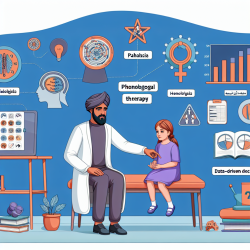In the field of speech-language pathology, creating effective and engaging interventions for children with language difficulties is paramount. A recent study titled "A Storytelling Approach on Vocabulary, Reading, and Letter Sound Fluency of Struggling First Graders With German as Second Language With and Without Behavioral Problems" provides valuable insights into how storytelling can significantly enhance language acquisition among young learners. This blog post delves into the key findings of the study and offers practical tips for practitioners to implement these insights in their practice.
The Power of Storytelling
Storytelling is more than just an entertaining activity; it is a powerful educational tool that can foster language development in multiple areas. According to the study, storytelling interventions were implemented three times a week over a six-week period with low-achieving first graders who spoke German as a second language (L2). The results were promising, showing significant improvements in vocabulary, reading, and letter sound fluency (LSF).
Key Findings
The study revealed several important outcomes:
- Significant large to very large effects on vocabulary acquisition.
- Moderate to large effects on letter sound fluency.
- Positive impacts on reading skills.
These findings underscore the potential of storytelling as a multi-component intervention that can address various aspects of language learning simultaneously.
Practical Implementation
To harness the benefits of storytelling in your practice, consider the following strategies:
1. Integrate Multi-Component Interventions
The study highlights the effectiveness of combining explicit and implicit learning components. Use storytelling sessions to introduce new vocabulary explicitly while also providing context through engaging narratives. This dual approach can maximize the likelihood of information retention.
2. Use Visual Aids
Incorporate visual aids such as flashcards and pictures to reinforce new vocabulary and letter sounds. The dual-coding theory suggests that presenting information both verbally and visually enhances memory retention.
3. Encourage Active Participation
Engage children in the storytelling process by asking questions and encouraging them to predict outcomes. This interactive approach not only makes the sessions more enjoyable but also reinforces learning.
4. Monitor Progress
Use self-graphing sheets to allow children to track their progress. This not only motivates them but also provides a visual representation of their improvement, reinforcing their efforts and achievements.
5. Tailor Interventions to Individual Needs
Recognize that each child is unique, and their learning needs may vary. Tailor your storytelling sessions to address specific areas where a child may be struggling, whether it’s vocabulary, reading, or letter sound fluency.
Encouraging Further Research
While the study provides valuable insights, it also opens the door for further research. Practitioners are encouraged to explore additional ways to integrate storytelling into their interventions and to share their findings with the broader educational community. By continuously refining our approaches, we can create even more effective strategies for supporting young learners.To read the original research paper, please follow this link:
A Storytelling Approach on Vocabulary, Reading, and Letter Sound Fluency of Struggling First Graders With German as Second Language With and Without Behavioral Problems.










